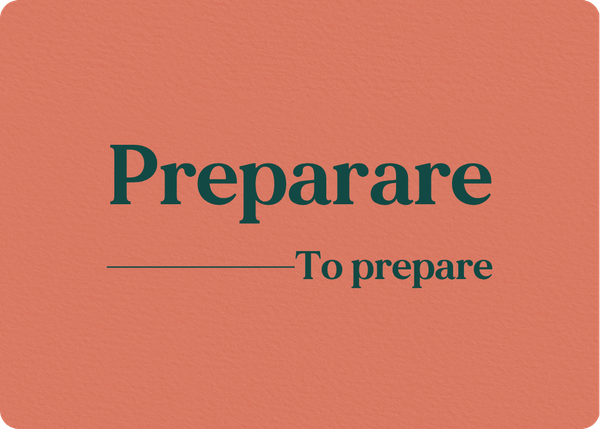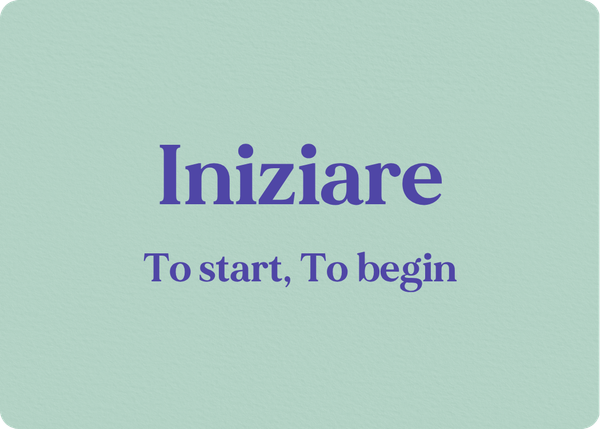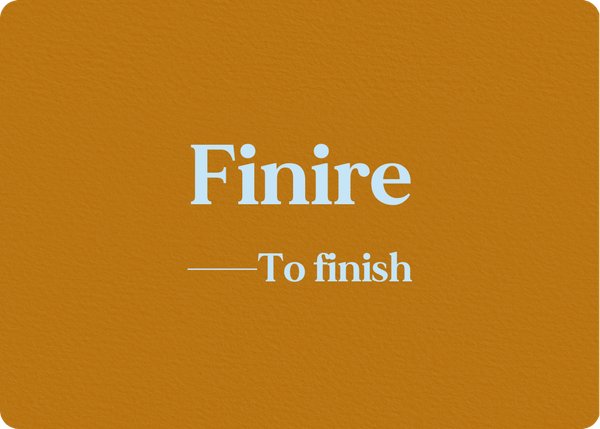What is Preparare?
Preparare is an Italian verb meaning "to prepare", "to get ready", or "to make ready". It belongs to the first conjugation (-ARE verbs) and follows regular conjugation patterns. This verb is useful for expressing preparation, planning, cooking, and organizing in Italian conversation and writing.
Key Features of Preparare:
- Type: Regular first conjugation verb (-ARE)
- Meaning: To prepare, to get ready, to make ready, to arrange
- Auxiliary verb: Uses "avere" (to have) for conjugation in compound tenses
- Past participle: Preparato
Indicativo – Indicative Mood
Presente (Present Tense)
| Person | Conjugation |
|---|---|
| io | preparo |
| tu | prepari |
| lui/lei | prepara |
| noi | prepariamo |
| voi | preparate |
| loro | preparano |
Example:
Preparo sempre la cena per tutta la famiglia.
I always prepare dinner for the whole family.
Passato Prossimo (Present Perfect)
| Person | Conjugation |
|---|---|
| io | ho preparato |
| tu | hai preparato |
| lui/lei | ha preparato |
| noi | abbiamo preparato |
| voi | avete preparato |
| loro | hanno preparato |
Example:
Agata ha preparato una torta deliziosa.
Agata prepared a delicious cake.
Imperfetto (Imperfect)
| Person | Conjugation |
|---|---|
| io | preparavo |
| tu | preparavi |
| lui/lei | preparava |
| noi | preparavamo |
| voi | preparavate |
| loro | preparavano |
Example:
Durante l'università, io e Marisa preparavamo insieme tutti gli esami.
During university, Marisa and I prepared all exams together.
Trapassato Prossimo (Past Perfect)
| Person | Conjugation |
|---|---|
| io | avevo preparato |
| tu | avevi preparato |
| lui/lei | aveva preparato |
| noi | avevamo preparato |
| voi | avevate preparato |
| loro | avevano preparato |
Example:
Aveva preparato la valigia la sera prima della partenza.
She had prepared the suitcase the evening before departure.
Passato Remoto (Simple Past)
| Person | Conjugation |
|---|---|
| io | preparai |
| tu | preparasti |
| lui/lei | preparò |
| noi | preparammo |
| voi | preparaste |
| loro | prepararono |
Example:
Lo chef preparò un menu speciale per l'occasione.
The chef prepared a special menu for the occasion.
Trapassato Remoto (Past Anterior)
| Person | Conjugation |
|---|---|
| io | ebbi preparato |
| tu | avesti preparato |
| lui/lei | ebbe preparato |
| noi | avemmo preparato |
| voi | aveste preparato |
| loro | ebbero preparato |
Example:
Dopo che ebbe preparato il discorso, si sentì più sicuro.
After he had prepared the speech, he felt more confident.
Futuro Semplice (Simple Future)
| Person | Conjugation |
|---|---|
| io | preparerò |
| tu | preparerai |
| lui/lei | preparerà |
| noi | prepareremo |
| voi | preparerete |
| loro | prepareranno |
Example:
Domani preparerò una sorpresa a Valeria per il suo compleanno.
Tomorrow I will prepare a surprise for Valeria for her birthday.
Futuro Anteriore (Future Perfect)
| Person | Conjugation |
|---|---|
| io | avrò preparato |
| tu | avrai preparato |
| lui/lei | avrà preparato |
| noi | avremo preparato |
| voi | avrete preparato |
| loro | avranno preparato |
Example:
Entro stasera avrò preparato tutti i documenti necessari.
By tonight I will have prepared all the necessary documents.
Congiuntivo – Subjunctive Mood
Presente (Present Subjunctive)
| Person | Conjugation |
|---|---|
| che io | prepari |
| che tu | prepari |
| che lui/lei | prepari |
| che noi | prepariamo |
| che voi | prepariate |
| che loro | preparino |
Example:
Mi aspetto che prepariate qualcosa di originale.
I expect you to prepare something original.
Passato (Past Subjunctive)
| Person | Conjugation |
|---|---|
| che io | abbia preparato |
| che tu | abbia preparato |
| che lui/lei | abbia preparato |
| che noi | abbiamo preparato |
| che voi | abbiate preparato |
| che loro | abbiano preparato |
Example:
Spero che Anna abbia preparato la presentazione per domani.
I hope Anna has prepared the presentation for tomorrow.
Imperfetto (Imperfect Subjunctive)
| Person | Conjugation |
|---|---|
| che io | preparassi |
| che tu | preparassi |
| che lui/lei | preparasse |
| che noi | preparassimo |
| che voi | preparaste |
| che loro | preparassero |
Example:
Era importante che lui preparasse bene il suo ultimo esame.
It was important for him to prepare well for his final exam.
Trapassato (Past Perfect Subjunctive)
| Person | Conjugation |
|---|---|
| che io | avessi preparato |
| che tu | avessi preparato |
| che lui/lei | avesse preparato |
| che noi | avessimo preparato |
| che voi | aveste preparato |
| che loro | avessero preparato |
Example:
Se avesse preparato una lista, non avrebbe dimenticato nulla al supermercato.
If he had prepared a list, he wouldn't have forgotten anything at the supermarket.
Condizionale – Conditional Mood
Presente (Present Conditional)
| Person | Conjugation |
|---|---|
| io | preparerei |
| tu | prepareresti |
| lui/lei | preparerebbe |
| noi | prepareremmo |
| voi | preparereste |
| loro | preparerebbero |
Example:
Prepareresti tu il caffè, per favore?
Could you make the coffee, please?
Passato (Past Conditional)
| Person | Conjugation |
|---|---|
| io | avrei preparato |
| tu | avresti preparato |
| lui/lei | avrebbe preparato |
| noi | avremmo preparato |
| voi | avreste preparato |
| loro | avrebbero preparato |
Example:
Avremmo preparato il materiale, se ci avessero mandato le indicazioni necessarie.
We would have prepared the materials if they had sent us the necessary instructions.
Imperativo (Imperative)
| Person | Conjugation |
|---|---|
| (tu) | prepara |
| (lui/lei) | prepari |
| (noi) | prepariamo |
| (voi) | preparate |
| (loro) | preparino |
Example:
Prepari il preventivo entro domani.
Prepare the estimate by tomorrow.
Indefinite Moods
Infinito (Infinitive)
- Presente (Present): preparare (to prepare)
- Passato (Past): avere preparato (to have prepared)
Examples:
Vorrei preparare un piano più dettagliato.
I would like to prepare a more detailed plan.
Simone pensa di aver(e) preparato un ottimo progetto.
Simone thinks he has prepared an excellent project.
Participio (Participle)
- Passato (Past): preparato (prepared) - also used as adjective
Example:
È uno studente molto preparato in matematica.
He's a very well-prepared student in mathematics.
Gerundio (Gerund)
- Presente (Present): preparando (preparing)
- Passato (Past): avendo preparato (having prepared)
Examples:
Preparando la colazione, ha rovesciato il latte sul tavolo.
While preparing breakfast, he spilled the milk on the table.
Avendo preparato tutto in anticipo, si goderono la festa.
Having prepared everything in advance, they enjoyed the party.
The verb Preparare at a glance: Key tenses you need
| Present | Present Perfect | Imperfect | Present Subjunctive | Imperfect Subjunctive | Present Conditional |
|---|---|---|---|---|---|
| io preparo | io ho preparato | io preparavo | che io prepari | che io preparassi | io preparerei |
| tu prepari | tu hai preparato | tu preparavi | che tu prepari | che tu preparassi | tu prepareresti |
| lui/lei prepara | lui/lei ha preparato | lui/lei preparava | che lui/lei prepari | che lui/lei preparasse | lui/lei preparerebbe |
| noi prepariamo | noi abbiamo preparato | noi preparavamo | che noi prepariamo | che noi preparassimo | noi prepareremmo |
| voi preparate | voi avete preparato | voi preparavate | che voi prepariate | che voi preparaste | voi preparereste |
| loro preparano | loro hanno preparato | loro preparavano | che loro preparino | che loro preparassero | loro preparerebbero |
Conclusion
Mastering the conjugation of "preparare" is essential for expressing preparation, planning, cooking, and organizing in Italian. As a regular first conjugation verb, it follows standard patterns throughout all tenses.
Remember the key points:
- Uses "avere" as auxiliary verb in compound tenses
- Regular first conjugation verb (-ARE) with standard patterns throughout all tenses
- Past participle is "preparato"
- Essential for expressing readiness, planning, and culinary tasksies
- Featured in many useful expressions related to daily life and planning
Keep practicing with real sentences and contextual examples to master this Italian verb!





